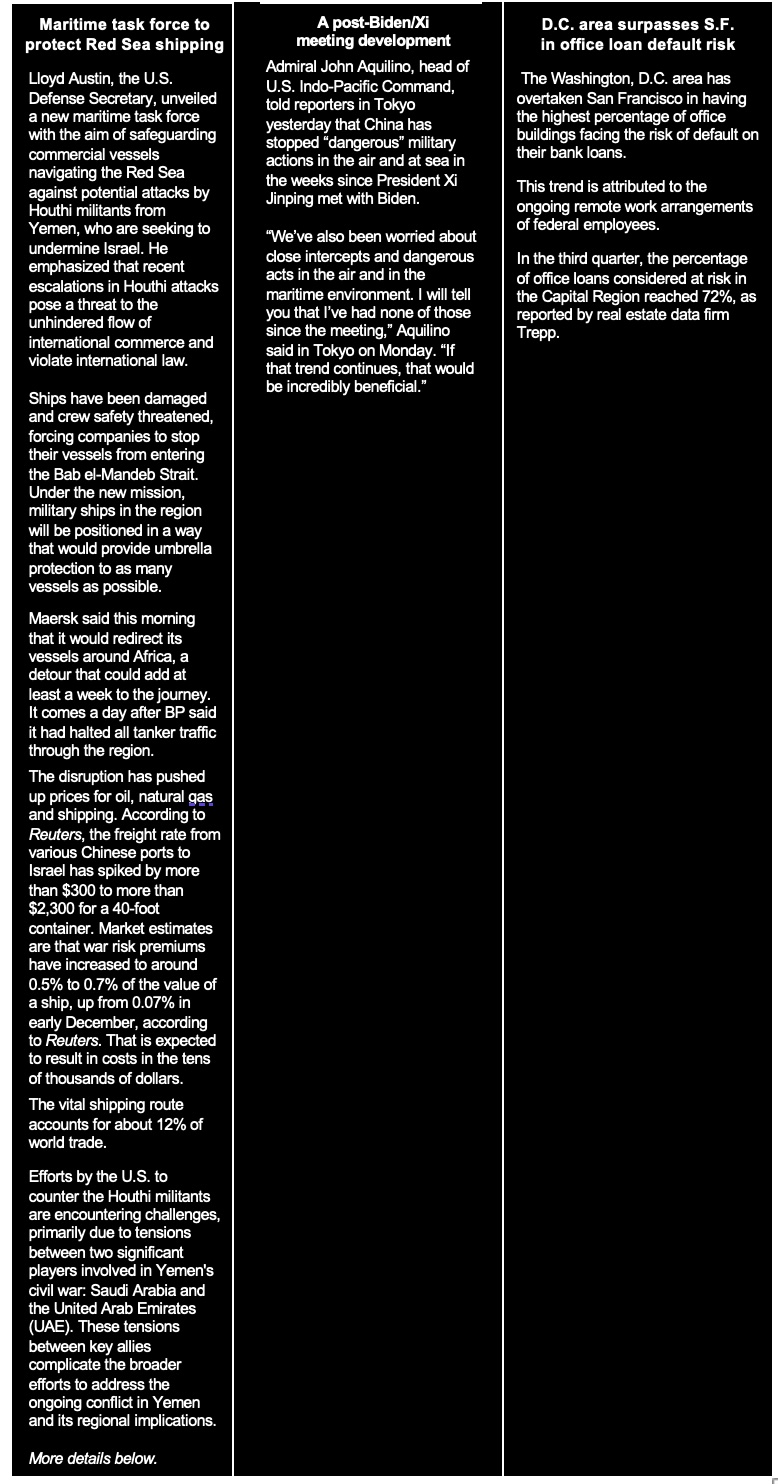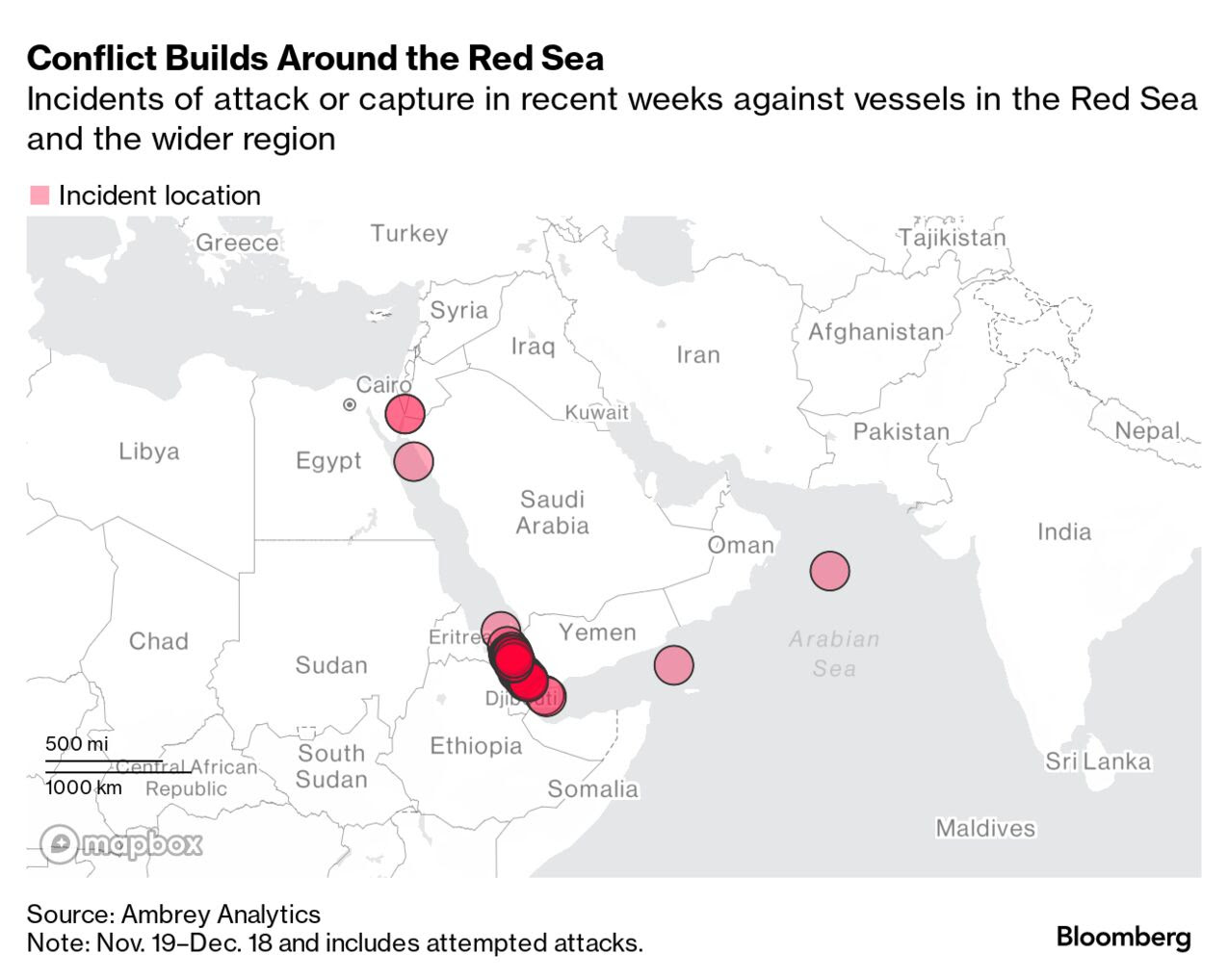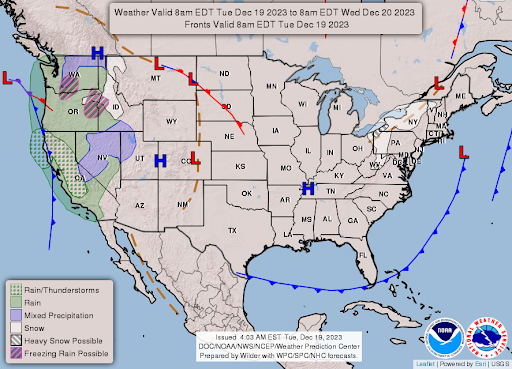Shipping Crisis in Red Sea Threatens World Trade

European-Asia shipping rates soar | Houthi rebels in Yemen continue to attack ships | Rerouting of cargo and tanker ships

|
Today’s Digital Newspaper |
MARKET FOCUS
- Shipping in Red Sea grinding to a halt and LNG vessels are beginning to reroute
- $14 billion deal involving Nippon Steel and U.S. Steel may face complications
- Fertilizer and chemical maker FMC initiating a global restructuring plan
- Bank of Japan decided to keep its key short-term interest rate at -0.1%
- Eurozone’s annual inflation rate decreased to 2.4%, lowest level since July 2021
- European natural gas futures experienced a significant drop of nearly 8%
- Ag markets today
- USDA daily export sale: 132,000 MT soybeans to unknown destinations, ‘23-24 MY
- Argentina mulls raising export taxes on soybean oil and soybean meal
- India directs rice industry to cut domestic prices
- Indonesia seeking 2 MMT of Thai rice next year
- Ag trade update
- NWS weather outlook
- Pro Farmer First Thing Today items
CONGRESS
- Senators facing challenges in reaching consensus on immigration reform
RUSSIA & UKRAINE
- Erdogan wants Russia to rejoin Black Sea grain deal
POLICY
- ERP payments continue to edge higher
- USDA opens enrollment for 2024 crop year in ARC and PLC programs
PERSONNEL
- Senators confirm former Maryland governor as head of Social Security Administration
CHINA
- PBOC adviser: China can achieve 5% economic growth again in 2024
- China, Russia pave even stronger ‘financial track’ with deal enhancing trade vitality
TRADE POLICY
- U.S. and EU agree to extend a truce on steel and aluminum imports
ENERGY & CLIMATE CHANGE
- EPA sends final rule to OMB for review of RVP waiver to allow year-round E15 sales
LIVESTOCK, NUTRITION & FOOD INDUSTRY
- HPAI infections continue to increase
- USDA sends two livestock market rules to OMB for review
- Railroad bridge closures at U.S./Mexico border worry Mexican poultry farmers
HEALTH UPDATE
- New variant of virus that causes Covid-19, known as JN.1, gaining prominence
OTHER ITEMS OF NOTE
- Migrants entering Texas face arrest
- Processing times for U.S. passport applications and renewals back to normal
- Subsidiary of Koch Industries set to acquire Iowa Fertilizer Company
|
MARKET FOCUS |
— Equities today: Asian and European stock markets were mixed overnight. U.S. Dow is currently around 150 points higher. In Asia, Japan +1.4%. Hong Kong -0.8%. China +0.1%. India +0.2%. In Europe, at midday, London -0.1%. Paris -0.2%. Frankfurt +0.3%.
U.S. equities yesterday: The Dow eked out a gain of 0.86 point, 0.00%, at 37,306.02, still its fourth record close in as many sessions. The Nasdaq was up 91.27 points, 0.62%, at 14,905.19. The S&P 500 gained 21.37 points, 0.45%, at 4,740.56.
— $14 billion deal involving Nippon Steel and U.S. Steel may face complications due to union concerns. The United Steelworkers, representing a significant portion of U.S. Steel's workforce, has called on regulators to scrutinize the transaction, citing labor and national security considerations. The union has expressed a preference for a deal with a domestic producer, Cleveland-Cliffs.
— Agriculture markets yesterday:
- Corn: March corn futures dropped 6 cents to $4.77 and settled nearer session lows.
- Soy complex: January soybean futures led the complex higher, closing 11 1/4 cents higher to $13.27. January meal futures settled $7.2 higher to $412.8, near session highs. January bean oil futures rallied 65 points to 50.64 cents.
- Wheat: March SRW wheat closed down 12 1/4 cents at $6.17 and near the session low. March HRW wheat fell 15 cents to $6.27 3/4, near the session low and hit a two-week low today. Spring wheat futures dropped 9 1/4 cents to $7.21 1/2.
- Cotton: March cotton closed down 83 points at 79.10 cents and near the session low.
- Cattle: February live cattle rose 27 1/2 cents to $169.625 though settled near the session low. Prices hit a two-week high early on. January feeder cattle closed up $2.275 at $223.175, near mid-range today and hit a three-week high early on.
- Hogs: February lean futures led the complex lower, falling 32.5 cents to $71.575.
— Ag markets today: Soybeans erased Monday’s gains during overnight trade, while corn and the winter wheat markets faced mild followthrough selling. As of 7:30 a.m. ET, corn futures were trading around a penny lower, soybeans were 8 to 10 cents lower, winter wheat markets were fractionally to a penny lower and spring wheat futures were narrowly mixed. Front-month crude oil futures and the U.S. dollar index were both modestly weaker.
Bullish cash cattle expectations. Cash cattle averaged $168.71 last week, down $1.23 from the previous week and the sixth straight weekly decline. That was the lowest cash price since the week ended March 24. But packers only purchased 40,000 head and slaughter runs have increased recently, causing some cash sources to believe packers are short-bought on slaughter needs – even with holiday-shortened kill schedules on the near-term horizon. With futures extending last week’s corrective gains, the general expectation is cash prices will be steady/firmer this week.
February hogs mildly extend premium to cash index. February lean hog futures dropped 32.5 cents on Monday but given a 56-cent decline in the CME lean hog index to $66.59 (as of Dec. 15), the contract finished at nearly a $5.00 premium to today’s quote. That premium will limit near-term buyer interest but also signals traders anticipate a solid rebound in the cash index from now until mid-February.
— Quotes of note:
- Fedspeak: San Francisco Fed President Mary Daly told the Wall Street Journal that it is appropriate for the Federal Reserve to start considering the possibility of lowering interest rates in 2024. This decision is influenced by the improvement in inflation seen this year. Daly's outlook on interest rates and inflation closely aligns with the median projections from 19 Federal Reserve officials made last week. The majority of these officials have anticipated at least three rate cuts next year due to a more rapid decrease in inflation than initially expected. Daly emphasized that the Federal Reserve is recognizing and responding to progress in the economic situation as it unfolds.
- Impact of alternative route to avoid Red Sea conflict. “All you know is it is going to cause chaos, and everything is going to get a lot more expensive.” — Richard Matthews, research director at E.A. Gibson Shipbrokers.
- Fertilizer and chemical maker FMC said Monday it was initiating a global restructuring plan “in response to the unprecedented downturn in the global crop protection market that resulted in severe channel destocking.” As part of the plan, FMC said, it launched a voluntary separation program in certain jurisdictions along with workforce reduction actions in its Brazil business. The company said it hopes the restructuring plan will add $50 million to $75 million to adjusted EBITDA in 2024. It is also, “targeting annual run-rate savings of $150 million or more by the end of 2025 from the program once fully implemented.”
- Big mo. “The market is kind of coasting on momentum.” — Michael Antonelli, market strategist at Baird, as stocks continue to rally on hopes of interest-rate cuts.
— The Bank of Japan decided to keep its key short-term interest rate at -0.1% and maintain 10-year bond yields at approximately 0% in its last meeting of the year. This decision aligns with widespread expectations, and the bank did not provide any indications about potential policy changes in the upcoming year. Additionally, the central bank has left unchanged an upper limit of 1.0% for long-term government bond yields.
The Japanese yen weakened 0.5% per dollar to 143.49 on Tuesday after the Bank of Japan maintained its ultra-loose monetary policy and provided no guidance on whether it may scrap the policy next year.
— In November 2023, the Eurozone’s annual inflation rate decreased to 2.4%, marking the lowest level since July 2021. This drop comes after a 2.9% inflation rate in October, aligning with the preliminary release. Several factors contributed to this decrease:
- Slower price growth: Prices for services rose at a slower pace, with a rate of 4% compared to 4.6% in the previous month. Similarly, non-energy industrial goods saw a slower increase, from 3.5% to 2.9%. Additionally, the category of food, alcohol, and tobacco experienced a decrease in price growth, going from 7.4% to 6.9%.
- Energy prices: Energy prices declined slightly more, with a decrease of -11.5% compared to -11.2% previously.
Meanwhile, the annual core inflation rate, which excludes energy, food, alcohol, and tobacco prices, was confirmed at 3.6%. This is the lowest reading since April 2022.
Looking ahead, it is expected that inflation may pick up in December due to an upward base effect for energy costs, as mentioned by ECB President Lagarde during a press conference following the latest ECB monetary policy decision. In 2024, the central bank anticipates a slower decline in inflation due to continued upward base effects and the gradual phasing-out of previous fiscal measures aimed at mitigating the impact of the energy price shock.
Market perspectives:
— Outside markets: The U.S. dollar index was weaker, with the euro, yen, and British pound all firmer against the U.S. currency. The yield on the 10-year U.S. Treasury note was weaker, trading around 3.90%, with a mostly lower tone in global government bond yields. Crude oil futures were under pressure, with U.S. crude around $7.235 per barrel and Brent around $77.85 per barrel. Gold and silver futures were higher ahead of U.S. economic updates, with gold around $2,044 per troy ounce and silver around $24.27 per troy ounce.
— European natural gas futures experienced a significant drop of nearly 8%, falling below €33 per megawatt-hour on Tuesday. This reversal followed a 7% increase in the previous session. Investors seemed to overlook concerns related to shipping disruptions and instead focused on the presence of ample gas supplies and mild temperatures. Despite heightened security concerns due to attacks on commercial ships in the Red Sea by Iran-backed Houthi militants, LNG (liquefied natural gas) tankers have been altering their routes. Of note: Crucial LNG shipments from Qatar to Europe continue via the Red Sea and the Suez Canal. As of Dec. 17, gas storage levels in the European Union were at 88.7%. Germany had storage levels at 91%, France at 87.3%, and Italy at 86.6%. These figures indicate a relatively healthy supply of natural gas, contributing to the decrease in futures prices.
— Shipping in the Red Sea is grinding to a halt and LNG vessels are beginning to reroute to take considerably longer journeys as the U.S. formed a task force to prevent more attacks by Houthi militants. Bloomberg reports (link) that two European oil and gas giants said Monday that their tankers would avoid waters off the coast of Yemen — an unavoidable waypoint for ships using the Suez Canal to cut between Europe and Asia. They join major container shippers who pulled out of the area last week as Iran-backed Houthi militants stepped up attacks in support of Hamas.
The U.S. is creating a multinational naval force called Operation Prosperity Guardian to protect merchant ships in the Red Sea, responding to Houthi rebel attacks that have jeopardized the Suez Canal's crucial role in global trade. This security operation will involve countries such as the U.K., Bahrain, France, Norway, and others. The Suez Canal has recently become a new focal point in the Israel-Hamas conflict, with global shipping companies being the primary targets. Many major shipping lines, oil producers, and cargo owners are rerouting their vessels away from this critical trade corridor. BP is among the companies that have withdrawn their tankers from the region, and numerous containership operators are opting for longer voyages around Africa's Cape of Good Hope. Link to more via the Wall Street Journal.
Perspective: Analysts say liner companies could need additional capacity equivalent to 1.7 million boxes to make up for longer routes to avoid the Red Sea. (Lloyd’s List). Meanwhile, China-Europe container shipping rates are soaring as Red Sea attacks push firms to skip the Suez Canal. Of note: China COSCO Shipping Corp. Ltd. will suspend shipments through the Red Sea. Meanwhile, the situation is compounding delays tied to the drought-stricken Panama Canal. Shipping companies have been forced to redirect shipments from Asia away from Panama and through the Suez Canal to ports on America’s East Coast. If the Suez troubles persists, observers say it could lead to congestion issues around North America.


— Argentine government, under President Javier Milei's administration, is considering raising export taxes on soybean oil and soybean meal. They plan to propose this increase to Congress, which would elevate the export tax rate on these products from the current 31% to 33%. The objective behind this move is to boost government revenue. The government has indicated that the additional revenue generated from these export taxes on soybean products could potentially be used to reduce or eliminate taxes on items such as wine and dairy. However, there is no specified timeline for when this proposal will be presented to Congress.
Details: The government reported that almost 20 regional economies, including dairy, will be excluded from the increase in withholdings announced last week, while for the wine sector they will go from 0% to 8% and as noted, those for soy by-products will increase from 31% to 33% with the objective of offsetting the fiscal cost of the measure. The decision was made after the discontent generated by the general increase in export duties that included, in addition to a devaluation that recognized a better exchange rate, the package of measures taken by Luis Caputo. The decision was communicated Monday morning by the Secretary of Bioeconomy, Fernando Vilella, and the Chief of Staff, Nicolás Posse, to members of the agricultural sector. Among the representatives of the private sector were the Liaison Table (Argentine Rural Society, Coninagro, Argentine Agrarian Federation and Argentine Rural Confederations) and representatives of the agroindustrial chain.
— India directs rice industry to cut domestic prices. India’s government directed rice industry associations “to ensure that the prices in the domestic market need to be brought down to optimal levels and efforts at profiteering dealt with strictly.” New Delhi says domestic rice prices are rising despite a good crop, ample stocks and regulations on rice exports.
— Indonesia seeking 2 MMT of Thai rice next year. Indonesia is seeking to buy 2 MMT of Thai rice next year, Thailand’s government said, a volume that would fulfil Jakarta’s planned import quota. Indonesia is seeking 1 MMT from the private sector and 1 MMT in a government-to-government deal.
— USDA daily export sale: 132,000 MT soybeans to unknown destinations, ‘23-24 MY.
— Ag trade update: Egypt tendered to buy an unspecified amount of wheat from multiple sources. Jordan made no purchases in its tender to buy 120,000 MT of milling wheat.
— NWS weather outlook: There is a Slight Risk of excessive rainfall over parts of Central/Southern California on Wednesday... ...Lake-effect snow downwind of the Lower Great Lakes and upslope snow over parts of the Central Appalachians... ...Rain for most of the West Coast.

Items in Pro Farmer's First Thing Today include:
• Grains weaker overnight
• Cordonnier cuts Brazilian crop forecasts
|
CONGRESS |
— Senators are facing challenges in reaching a consensus on immigration reform, and this impasse is affecting the progress of aid packages for both Israel and Ukraine. According to Senate Minority Whip John Thune (R-S.D.), it is unlikely that the Senate will be able to vote on an immigration deal this week. Thune said negotiators were unable to resolve thorny issues during talks over the weekend. Consequently, the approval of aid for Ukraine and Israel is also postponed for the foreseeable future. Sen. Roger Wicker (R-Miss.), the ranking member of the Armed Services Committee, said he anticipates the parties will reach a deal, at least in principle, on Ukraine aid and border policy by the end of the week. That would tee up votes on the legislation the first or second week in January, he said. Minority Leader Mitch McConnell (R-Ky.) suggested talks will extend “beyond” this week, but remained committed to getting a deal. The House is out until Jan. 9.
— No surprise: The 118th Congress is on track to be one of the least productive in modern history, with just a couple dozen laws on the books at the close of 2023. Link to more via Axios.
|
RUSSIA/UKRAINE |
— Erdogan wants Russia to rejoin Black Sea grain deal. Turkish President Tayyip Erdogan said he will speak with his Russian counterpart Vladimir Putin soon to urge Moscow to revive the Black Sea grain initiative. Russia on Sunday reiterated it has no desire to restart the deal.
|
POLICY UPDATE |
— ERP payments continue to edge higher. Total payments under the Emergency Relief Program (ERP) moved up to $8.29 billion as of Dec. 17 as ERP Phase 2 payments moved up in the latest week. Phase 2 payments reached $837.5 million to 10,152 recipients, up from $824.9 million the prior week. Phase 1 payments remained at $7.45 billion.
— USDA opens enrollment for 2024 crop year in ARC and PLC programs. USDA announced that agricultural producers can now enroll in the Farm Service Agency's (FSA) Agriculture Risk Coverage (ARC) and Price Loss Coverage (PLC) programs for the 2024 crop year (link). Producers can make election changes and enroll for the 2024 crop year starting from Dec. 18, 2023, with the enrollment deadline set for March 15, 2024.
Background. The extension of the Agriculture Improvement Act of 2018, commonly known as the 2018 Farm Bill, through Sept. 30, 2024, allows authorized programs like ARC and PLC to continue operating without changes.
Producers have the option to elect coverage and enroll in ARC-County (ARC-CO) or PLC, which provide crop-specific protection, or ARC-Individual (ARC-IC), which protects the entire farm. While election changes for 2024 are voluntary, producers must complete enrollment through a signed contract each year. Multi-year contracts will continue for 2024 unless an election change is made.
The covered commodities for these programs include various agricultural products such as barley, corn, lentils, oats, peanuts, soybeans, wheat, and more.
ARC and PLC payments for the 2022 crop year have already been issued, and payments for the 2023 crop year will be issued in the fall of 2024, based on finalized county yields and market prices.
ARC and PLC elections and enrollments can impact eligibility for certain crop insurance products. Different program elections have varying effects on insurance options like Supplemental Coverage Option (SCO) and Enhanced Coverage Option (ECO).
Producers are encouraged to use web-based decision tools offered by universities to make informed decisions based on their specific farming operations. More information on ARC and PLC can be found on the USDA's website (link), and producers can also complete elections and enroll online through level 2 eAuth (link).
|
PERSONNEL |
— Senators confirmed former Maryland Gov. Martin O’Malley (D) as the next head of the Social Security Administration in a 50-11 vote. The last time more than 30 Senators missed a vote was two years ago on a procedural vote for a circuit judge nominee, according to a post from the Senate Periodical Press Gallery.
Meanwhile, Senate Majority Leader Chuck Schumer (D-N.Y.) said the chamber would stay in Washington this week to confirm nominations of military members whose promotions Sen. Tommy Tuberville’s (R-Ala.) delayed for months by blockade in protest of the Pentagon’s abortion policy.
|
CHINA UPDATE |
— PBOC adviser: China can achieve 5% economic growth again in 2024. China should be able to maintain the same level of economic growth in 2024, said Wang Yiming, a policy adviser to the People’s Bank of China (PBOC). China’s economy is likely to grow 5% next year, if investment rises 4% to 5%, consumption rises 6% to 7% and exports return to growth, Wang said. He also noted China has room to increase support for the economy given the central government’s debt burden and consumer prices are both relatively low. Wang said China may be able to cut interest rates as the Federal Reserve has likely stopped raising U.S. rates, although a wide interest rate gap between the two countries and worries about the impact on banks could act as constraints.
— China, Russia pave even stronger ‘financial track’ with a new deal enhancing trade vitality. Russian Prime Minister Mikhail Mishustin is back in China for the second time this year, and the neighbors’ latest trade deal involves greater oversight of capital flows and bonds. Link to details via the South China Morning Post.
|
TRADE POLICY |
— The European Union (EU) and the United States agreed to extend a truce on steel and aluminum imports, preventing the reintroduction of tariffs on transatlantic trade. The European Commission, the EU's executive branch, announced that retaliatory measures implemented during the Trump administration would be suspended for 15 months, until March 31, 2025. However, the EU was unsuccessful in convincing the US to make its current tariff-rate quotas (TRQs) more flexible.
This extension will result in significant savings for EU steel and aluminum exporters, estimated at around €1.5 billion ($1.6 billion) in tariffs annually. The U.S. will also need to complete its own process to extend its TRQ system for the same period, starting from January.
The EU has expressed dissatisfaction with the current quota system, which includes quarterly quotas for 54 steel mill product categories and 16 aluminum mill product categories. They have been advocating for improvements, including annual quotas for the European market.
Timeline. Both the EU and the US are racing against time to finalize the Global Arrangement on Sustainable Steel and Aluminum (GSA), which would provide a permanent solution to the trade dispute that began during the Trump era. The GSA is set to maintain tariff exemptions until after the U.S. presidential election in November 2024.
The EU's main objective in the GSA negotiations is to have all tariff-rate quotas lifted, while the U.S. opposes this demand. The EU could potentially relaunch a case against the U.S. at the World Trade Organization or reimpose tariffs on American products if an agreement cannot be reached. However, such actions lack broad support among EU member states, as they are concerned about escalating trade tensions ahead of the upcoming US election.
|
ENERGY & CLIMATE CHANGE |
— EPA sent a presumably final rule to the Office of Management and Budget (OMB) for review re: an RVP waiver to allow year-round E15 sales. This rule pertains to a request from several states to remove the 1-psi volatility waiver under the Clean Air Act concerning ethanol fuel blends, effectively allowing year-round sales of E15. The states involved in this request include Illinois, Iowa, Minnesota, Missouri, Nebraska, Ohio, South Dakota, and Wisconsin. While the EPA introduced a proposed rule to enable this action in March, they have not specified a deadline for the issuance of the final rule, categorizing it as "to be determined."
|
LIVESTOCK, NUTRITION & FOOD INDUSTRY |
— Highly pathogenic avian influenza (HPAI) infections continue to increase, with data from USDA's Animal and Plant Health Inspection Service (APHIS) up to Dec. 15 showing additional commercial sites affected. Since Dec. 11, HPAI has been confirmed in various locations, including Olmsted County, Minnesota (15,100 commercial turkey breeder hens); Lake County, South Dakota (76,000 commercial turkey meat birds); Rice County, Kansas (700,000 commercial table egg layers); San Joaquin County (6,000 commercial duck breeder birds) and Merced County (183,100 commercial broiler production birds and 1,358,000 commercial table egg layers), California; and Darke County, Ohio (560,000 commercial table egg layers).
In the past 30 days, a total of 62 commercial flocks and 36 backyard flocks have been confirmed with HPAI, impacting a total of 11.08 million birds.
— USDA sends two livestock market rules to OMB for review. USDA's Agricultural Marketing Service has submitted two additional proposed rules concerning livestock market matters to the Office of Management and Budget (OMB) for review. The first rule focuses on "Unfair Practices, Undue Preferences, and Harm to Competition Under the Packers and Stockyards Act." It aims to revise regulations under the Packers and Stockyards Act to provide clarity regarding violations of the Act. Furthermore, it seeks to clarify the Act's scope to determine actions or conduct that could be in violation of the Act, even without evidence of harm or likely harm to competition. USDA's position is that the Act should primarily address cases involving harm to competition.
On the poultry front, the second proposed rule deals with "Poultry Grower Payment Systems and Capital Improvement Systems." This rule is designed to address certain problematic practices within poultry grower payment systems and capital improvement programs.
Timing. USDA plans to release the proposed rule on unfair practices in February and the rule concerning poultry growers in January. These rules are part of the Biden administration's commitment to addressing issues within the livestock industry.
— Railroad bridge closures at U.S./Mexico border worry Mexican poultry farmers. The closure of railroad bridges at Eagle Pass and El Paso along the U.S./Mexican border has raised concerns among Mexican poultry farmers who depend on shipments of feed that typically pass through these bridges. Mexico's National Union of Poultry Producers (UNA) revealed that approximately 25% of Mexico's yellow corn imports from the U.S. and 63% of its soybean paste imports enter Mexico via these two border crossings.
UNA has requested the support of Mexican authorities to intervene and negotiate the reopening of these railway crossings as soon as possible. They have emphasized that the shutdown could potentially impact the production of chicken and eggs in Mexico.
The decision to temporarily close the railroad bridges was made by the U.S. Customs and Border Protection (CBP), citing the need to redirect personnel to assist the U.S. Border Patrol in handling the custody of migrants. CBP has not provided any specific information regarding the duration of the bridge closures.
|
HEALTH UPDATE |
— A new variant of the virus that causes Covid-19, known as JN.1, is gaining prominence in the United States, coinciding with the peak of the winter illness season. JN.1 is another descendant of the Omicron variant. Initially detected in the U.S. in September, JN.1 had a slow spread in the beginning. However, in recent weeks, it has been identified in an increasing percentage of test samples that were sequenced by labs associated with the U.S. Centers for Disease Control and Prevention (CDC). During the two-week period ending on Dec. 9, JN.1 accounted for more than 20% of these sequenced samples. Some projections suggest that JN.1 could be responsible for at least half of new Covid-19 infections in the U.S. by the end of December.
|
OTHER ITEMS OF NOTE |
— Processing times for U.S. passport applications and renewals are back to normal after years plagued by delays and backlogs. Routine services will now take six to eight weeks, the State Department said Monday — a significant improvement from wait times of up to 18 weeks during the pandemic.
— Republican Gov. Greg Abbott of Texas signed a border bill on Monday that transforms entering Texas illegally into a state crime. This legislation, known as SB 4, empowers local law enforcement to arrest migrants, and it gives judges the authority to issue orders for their removal to Mexico. The announcement of this bill has generated significant apprehension within the Latino community in Texas, constituting 40% of the state's population. The law is scheduled to go into effect in March.
— A subsidiary of Koch Industries is set to acquire the Iowa Fertilizer Company from Dutch chemical manufacturer OCI Global for $3.6 billion. Iowa Fertilizer, which commenced production in 2017 in southeastern Iowa, is recognized as the first large-scale nitrogen fertilizer factory constructed in the United States in a quarter-century, according to OCI. Following the acquisition, Iowa Fertilizer will become a part of Koch Ag and Energy Solutions, a company that operates fertilizer facilities and terminals in Europe and the Americas. Iowa Fertilizer has the capacity to produce 3.5 million metric tons annually of nitrogen fertilizers and diesel exhaust fluid, which helps reduce vehicle emissions. Koch Industries, a privately held company, boasts annual revenues of up to $110 billion and engages in various sectors, including electronics, refining, chemicals, and biofuels. OCI Global's executive chairman, Nassef Sawiris, noted that the revenue from the sale will support the advancement of the company's decarbonization projects, positioning them as leaders in the low-carbon space.
|
KEY LINKS |
WASDE | Crop Production | USDA weekly reports | Crop Progress | Food prices | Farm income | Export Sales weekly | ERP dashboard | California phase-out of gas-powered vehicles | RFS | IRA: Biofuels | IRA: Ag | Student loan forgiveness | Russia/Ukraine war, lessons learned | Russia/Ukraine war timeline | Election predictions: Split-ticket | Congress to-do list | SCOTUS on WOTUS | SCOTUS on Prop 12 pork | New farm bill primer | China outlook | Omnibus spending package | Gov’t payments to farmers by program | Farmer working capital | USDA ag outlook forum | Debt-limit/budget package |






